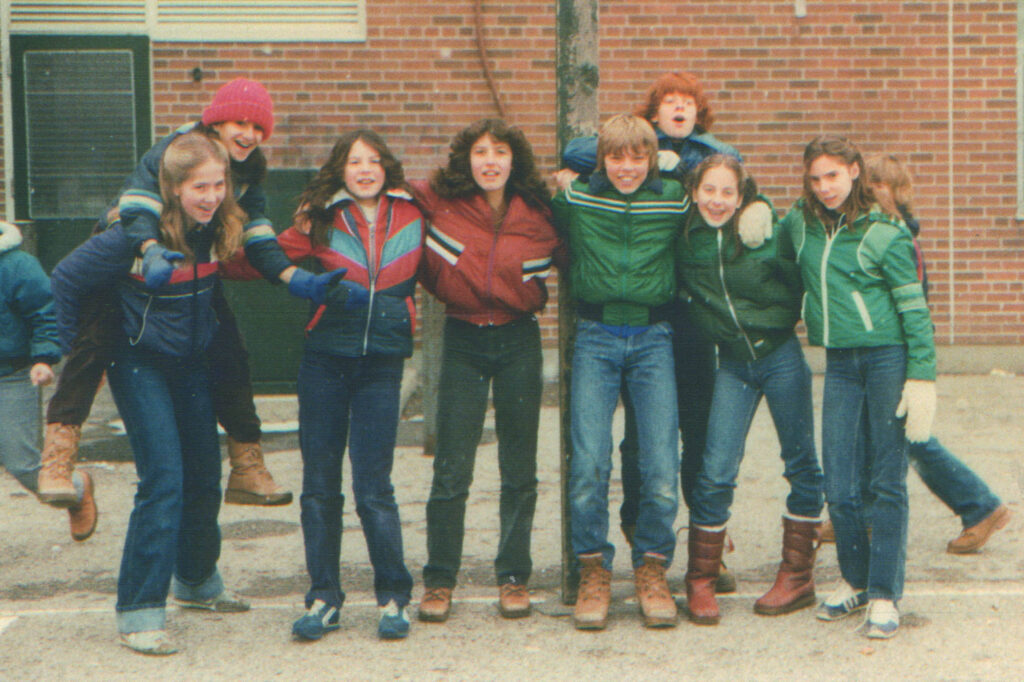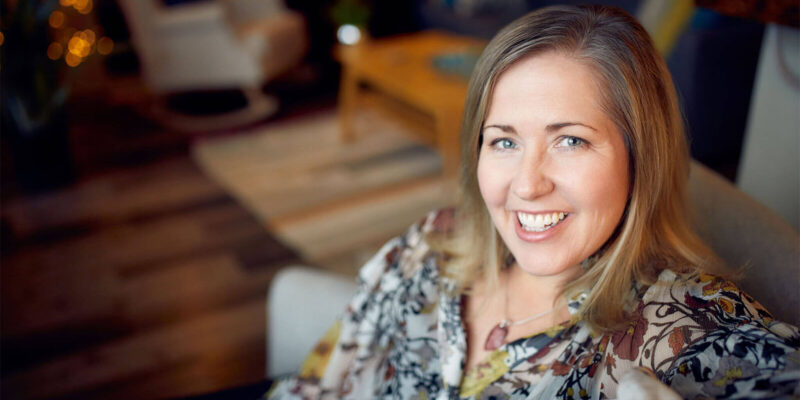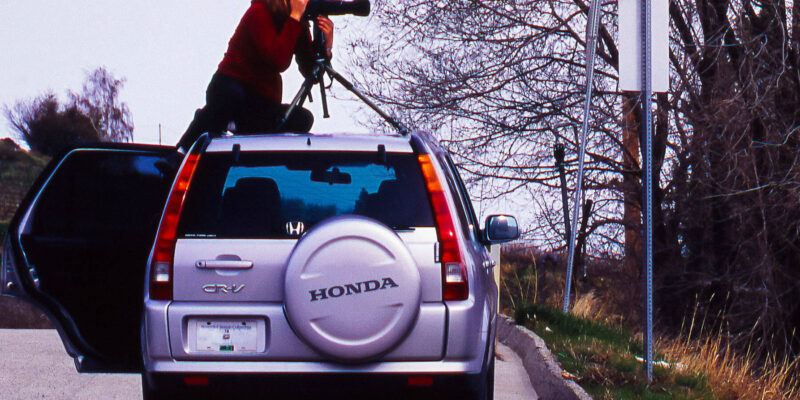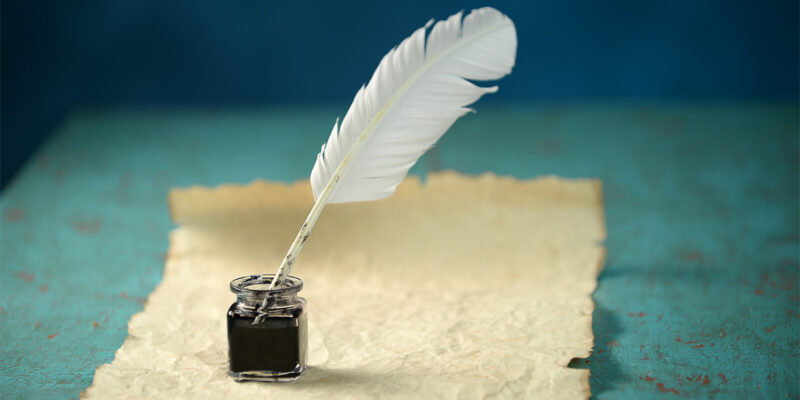On Friday I shared a link to an episode of The Daily podcast called The Sunday Read. The Daily is published by The New York Times. If they think Sunday, with its different pace for many, is a good day for stories, I’ll forego years of my own research and start the Sunday Stories category of this Daily Letter.
About this particular story:
When I started memoir writing last year I discovered that many of my childhood memories were intertwined with memories of my best friend Louise Gonsalves.
Today would have been Louise’s 54th birthday. For one month of each, she was the eldest of our lot.
Louise died of cancer in 2005. Mining my memory for this story was bittersweet, but mostly sweet.
Happy Birthday, Louise!

Photo courtesy of David Corkill, the boy in the green jacket.
Along with twenty-six other St Richard’s students born in 1967, Louise and I were subjects in a Canadian social experiment. We became students in the first year of the “bilingual program.” Starting in grade 5, half our day was taught in English, and half our day in French. The structure of the program had many results. The main mission was accomplished. We became functionally bilingual by the time we left Grade 8.
There were some other possibly unexpected results. Once registration in the program closed, new students in the classroom were rare. Because the prerequisite became “must speak French,” only two new students joined our group in grades five through eight, and no one ever left. We got to know each other very well. In time we made the most of our tribal instincts and learned to operate like a well oiled machine.
That’s not to say the usual classroom hierarchy didn’t exist. Within “the twenty-eight” there were the the cute kids, the athletic kids, the smart kids, the rebellious kids, and so on. But conflict was rare.
Within the social hierarchy of the twenty-eight, Louise and I received another somewhat more dubious distinction. Educators were innovating at institutional lightning speed in 1977. They introduced not one, but two new programs starting in Grade 5. We had barely settled into “here you go, half your day is in a second language,” when they rolled out testing for The Gifted Program.
I don’t remember there being any doubt around our kitchen table that Louise and I would be dubbed “gifted.” My mom was a teacher, so there was plenty of school talk at home. I wanted it, but didn’t want it, if you know what I mean. It was one thing to be in a group of twenty eight. It was quite another to be singled out as having some kind of superpower. I dreaded leaving our cohesive unit every Wednesday. My discomfort was heightened by where the program was located. It was right in our school.
When there weren’t kids from the “normal classroom” trying to take a peek in through the windows, it was OK enough when we were there. Sometimes they taught us practical things like how to fill out tax forms. We were more often given creative and scientific pursuits.
Time has memorialized the day of the paper airplane competition. We were to work with a partner and build a plane out of four materials: construction paper, popsicle sticks, paper clips and plasticine. Then, we would go out in the school yard and see which plane would fly the furthest. It was meant to be fun, but unlike our schoolroom home, we had divided along an unmistakable line. Competition between the boys and girls was fierce.
Louise and I were partners. Obviously. The only rule was we had to use some quantity of all four materials. We reasoned it out, evidence it was me who took the lead. Louise and I constructed a giant plane using the full sheet of paper, supported by a carefully constructed exoskeleton of popsicle sticks. We added a tiny bit of plasticine to to the nose to help give it direction. We admired our handiwork, but kept it hidden from our arch rivals, Stuart and Joel.
When it was time to go outdoors and assemble at the starting line, it became apparent our strategy was flawed. The wings of our plane lofted in the breeze as we held it between us. The boys’ plane was much smaller. Stuart and Joel had glued several popsicle sticks together side by side and end to end to use as the main body of the plane. Paper wings protruded from the sides. Plasticine and a paper clip held the the tail in place. One look and Louise and I knew we were done. Their invention was sleek and more dense. It was even elegant looking.
With our soon to be squashed pride gathering as lumps in our throats, Louise and I hoisted our plane into the air. It traveled upward well enough, but then it failed to fill its wings with air and spiraled to the ground. Stuart and Joel doubled over, laughing loudly.
Then it was their turn. All arms and legs, and nearly six feet tall, Stuart was part of their strategy. He stepped up to the start line and used his whole body to catapult their plane into the air. It flew efficiently for what felt like an eternity, landing multiple distances beyond ours.
I conceded defeat, but Louise was having none of it. She sprinted back into the school, yelling “I’ll be right back!”
When she emerged a few minutes later, she had something in her right hand. It was a ball of all our leftover plasticine, stabbed with one popsicle stick and a paper clip. In her left hand , she held a scrap of construction paper.
“Help me with this!” Louise thrust the ball into my waiting hands. It was still warm from furious rolling. Working quickly, she folded the paper into a tiny triangle. Using a long pinkie fingernail, she sliced into the plasticine and inserted the paper triangle.
Before the teacher could stop her, Louise grabbed our new contraption and ran back up to the start line. She used her compact frame and well-practiced baseball arm to her advantage and threw the “plane” as far as she could.
The measly popsicle stick and scrap of paper were no hindrance to Louise’s new understanding and cunning use of Newtonian physics. It shot through the air like a meteor before landing with a thud, eventually rolling to a stop.
We all stood there with mouths gaping. Louise had literally thrown a home run.
The boys erupted in protest, and an epic argument broke out. They had a strong and simple argument – a second attempt was not in the rules. The teacher had no choice but to side with the boys, but everyone knew who the real winner was that day. It was Louise. The spark and smile in our exhausted teacher’s eyes was all anyone needed for confirmation.
“She knew we won, didn’t she?” Louise asked me under her breath to avoid further chaos. As if I had anything to do with it.
I learned a couple of things about my best friend that day. She never fought back like that when we the competition was between her and me, which was often. And it was possible that at least some of the time, she was letting me win.



